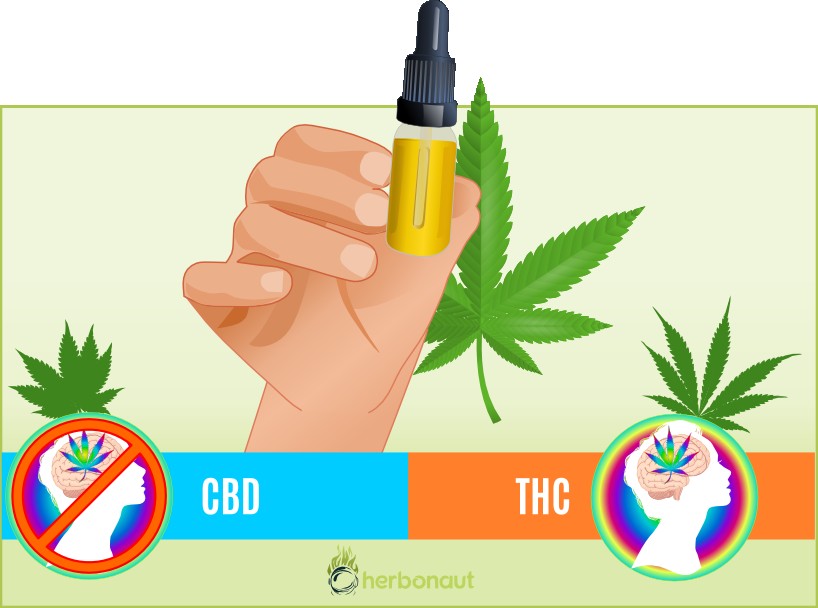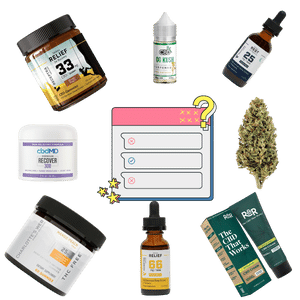
There’s no scientific evidence supporting the idea that CBD causes anxiety.
In fact:
There’s some scientific evidence supporting the idea that CBD can reduce anxiety.
How is it possible then that some people experience anxiety when taking CBD?
Well, this can be because of one of the following reasons:
- The CBD product contains high levels of THC;
- The CBD product contains synthetic cannabinoids;
- The CBD product contains contaminants like heavy metals or pesticides.
As you can see, it’s not the CBD itself that causes anxiety in these cases. It’s other compounds that are present inside the CBD product that shouldn’t be there at all, or at least not in those concentrations.
Let’s dive deeper into these three scenarios.
Table of contents:
The CBD Product Contains High Levels of THC
The CBD Product Contains Synthetic Cannabinoids
The CBD Product Contains Contaminants Like Heavy metals or Pesticides
The CBD product contains high levels of THC
THC is a natural compound that’s present in cannabis plants. Broadly speaking, cannabis plants come in two variations:
- Marijuana plants, and;
- Hemp plants.
In Marijuana plants, THC is present in high concentrations (up to 30%) and CBD in low concentrations. In Hemp plants, THC is present in low concentrations, but CBD in higher concentrations.
But there’s also a legal definition of ‘hemp’ that’s more concrete than ‘low THC, high CBD’.
Based on federal law in the U.S., hemp plants may have a maximum THC concentration of 0.3% based on the dry weight of the flower. If a cannabis plant has a THC percentage of above 0.3%, under federal law, it’s not hemp anymore but is categorized as marijuana.
Marijuana is federally illegal.
Now:
The only CBD products that are federally legal are hemp-derived products. So the maximum THC percentage of federally legal, hemp-derived CBD products is also 0.3%.
However, it sometimes happens that CBD products contain more THC than the legally allowed 0.3%. This can happen when:
- The original plants contain more than 0.3%, or;
- During the production process the hemp extract gets so concentrated that the THC-percentage increases.
In any case, FDA tests have shown that CBD products can contain too high concentrations of THC (1). It’s unclear from which percentage you will start feeling the effects of THC. But if your product has more than 0.3% THC, there’s a chance you will experience the side effects associated with THC.
So, what are the effects of THC?
THC can produce psychoactive effects. It can make you ‘high’.
But more importantly:
One of the common side effects of consuming high concentrations of THC is anxiety.
Even though CBD works as an anxiety-reducing compound, also when it comes to THC-induced anxiety…
You may still experience anxiety when taking CBD and high amounts of THC together. Just keep in mind: it’s not the CBD that’s causing anxiety, it’s the THC.

But even if you have a legal CBD product with a THC percentage of 0.3%, it’s possible to ingest high concentrations of THC.
Here’s how:
In our experience testing and reviewing CBD oils, the small amounts of THC inside the oil have a tendency to concentrate at the bottom of the bottle.
When you compare the molar mass of THC (314.47 g/mol) to CBD’s (314.45 g/mol), you can also see THC’s is slightly higher. Whether this small difference in molar mass is the reason or there’s another reason…
It’s undeniable:
The THC inside a bottle of CBD oil seems to concentrate at the bottom of the bottle after some time.
Therefore, it’s very important to shake your bottle before you use it.
If you don’t shake CBD oil well before using it, you risk ingesting more THC than you may expect.
For example:
Your bottle may only have a THC-percentage of 0.2%. But if the THC concentrated at the bottom of the bottle, the percntage could be 1%.
Ingesting 1% THC may cause some anxiety.
Lastly:
Even if your CBD oil only contains 0.3% THC, and you shake your bottle, you may still experience anxiety when taking a full-spectrum CBD oil.
A very small percentage of the population is hypersensitive to THC. If you fall in this group, even small amounts of THC may trigger anxiety.
If:
- you got your CBD oil from a trustworthy source,
- you’ve checked the third-party lab-test reports,
- you’ve shaken your bottle before use,
and you still experience anxiety when taking full-spectrum CBD, you may be hypersensitive to THC.
If you get anxiety when taking any THC, you should avoid full-spectrum CBD products. Instead go for a high-quality broad-spectrum CBD product.
CBD Product Finder: Answer a Few Questions and Let Us Find the Best CBD Product for You in Less Than a Minute
Yes, I Want to Find the Best CBD Product for My Specific Situation →
Click the link below if you want to learn more about:
The CBD Product Contains Synthetic Cannabinoids
Various studies found that CBD products can contain synthetic cannabinoids (2, 3).
Synthetic cannabinoids mimic the effects of natural cannabinoids.
They interact with the same receptor systems and produce similar effects.
However:
They don’t produce the exact same effects.
Synthetic cannabinoids interact with the same receptors as their natural counterparts. But the quality of this interaction is different.
For example:
AB-FUBINACA is a synthetic cannabinoid found in contaminated CBD oil. It’s a potent activator of cannabinoid receptors (4). Much more potent than THC, for example.
You could in some ways see AB-FUBINACA as a more potent version of natural THC.
And since anxiety is a known side effect of THC…
Even small concentrations of AB-FUBINACA can cause unexpected effects like anxiety. Many synthetic cannabinoids have been associated with extremely negative (side) effects (5).
You want to avoid synthetic cannabinoids at all times.
If you don’t buy your CBD product from a trustworthy source, one that regularly publishes lab-test reports…
You risk ingesting synthetic cannabinoids.
So in this case again, it’s not the CBD that causes anxiety. It’s a different compound that’s inside your CBD product, that’s not supposed to be there.
The CBD Product Contains Contaminants Like Heavy metals or Pesticides

Why would there be any heavy metals or pesticides inside your CBD product?
Well, this is related to what type of plant the hemp plant is.
The hemp plant is a bio-accumulator plant (6).
This means that the hemp plant absorbs all biological and chemical compounds from the soil it’s grown in.
When this soil contains:
- heavy metal pollution, or,
- pesticides from previous crops,
hemp plants will absorb all of these contaminants.
And when the producer extracts CBD from these hemp plants, the heavy metals and pesticides come with it.
In rare cases, the hemp farmer will even make use of pesticides while growing the hemp plants.
So whether it’s by accident or purposefully…
That’s how heavy metals and pesticides can end up in your CBD product.
Both pesticides and heavy metals have been associated with various negative health effects. One of these negative health effects is increased anxiety.
For example:
A 2016 study found that low-level but chronic exposure to organophosphates increased risk of anxiety symptoms (7). Organophosphates are a group of pesticides.
Many studies have found a link between exposure to heavy metals and mood disorders like anxiety (8).
The bottom line:
If you have a contaminated CBD product with:
- heavy metals,
- pesticides, or,
- residual solvents,
you may experience anxiety because of these contaminations.
Again, it’s not the CBD itself that causes the anxiety, but the toxic contaminations.
Conclusion
Can CBD cause anxiety?
No, CBD itself can’t cause anxiety. Hundreds of studies have looked at the side effects of CBD and anxiety never emerged as a side effect of using CBD.
However other compounds inside CBD products can cause anxiety.
Some of these compounds are supposed to be there. For example, small amounts of THC inside a full spectrum CBD product are supposed to be there.
Some of these compounds are not supposed to be there in high concentrations. For example, THC shouldn’t be inside CBD products in concentrations higher than 0.3%.
Other compounds are not supposed to be there at all. For example, CBD products should always be free from:
- synthetic cannabinoids,
- heavy metals,
- pesticides, or,
- residual solvents.
What’s Next
Find a high-quality CBD oil for anxiety relief
Learn more about using CBD for anxiety relief
Learn about the side effects of CBD products
Find high-CBD flower for anxiety relief
Sources:
-
U.S. Food and Drug Administration. (2020, July). Sampling Study of the Current Cannabidiol Marketplace to Determine the Extent That Products are Mislabeled or Adulterated. Author. Retrieved from https://hempsupporter.com/assets/uploads/CBD-Marketplace-Sampling_RTC_FY20_Final.pdf
-
Rianprakaisang, T., Gerona, R., & Hendrickson, R. G. (2019). Commercial cannabidiol oil contaminated with the synthetic cannabinoid AB-FUBINACA given to a pediatric patient. Clinical Toxicology, 58(3), 215–216. https://doi.org/10.1080/15563650.2019.1619758
-
Orsburn, B. (2020). Non-targeted Screening of Commercial CBD Products in the United States Reveals Common Contamination and Adulteration. Non-Targeted Screening of Commercial CBD Products in the United States Reveals Common Contamination and Adulteration. Published. https://doi.org/10.1101/2020.08.25.267302
-
Banister, S. D., Moir, M., Stuart, J., Kevin, R. C., Wood, K. E., Longworth, M., . . . Kassiou, M. (2015). Pharmacology of Indole and Indazole Synthetic Cannabinoid Designer Drugs AB-FUBINACA, ADB-FUBINACA, AB-PINACA, ADB-PINACA, 5F-AB-PINACA, 5F-ADB-PINACA, ADBICA, and 5F-ADBICA. ACS Chemical Neuroscience, 6(9), 1546–1559. https://doi.org/10.1021/acschemneuro.5b00112
-
Fattore, L. (2016). Synthetic Cannabinoids—Further Evidence Supporting the Relationship Between Cannabinoids and Psychosis. Biological Psychiatry, 79(7), 539–548. https://doi.org/10.1016/j.biopsych.2016.02.001
-
Dubrow, G. A., Pawar, R. S., Srigley, C., Fong Sam, J., Talavera, C., Parker, C. H., & Noonan, G. O. (2021). A survey of cannabinoids and toxic elements in hemp-derived products from the United States marketplace. Journal of Food Composition and Analysis, 97, 103800. https://doi.org/10.1016/j.jfca.2020.103800
-
Harrison, V., & Mackenzie Ross, S. (2016b). Anxiety and depression following cumulative low-level exposure to organophosphate pesticides. Environmental Research, 151, 528–536. https://doi.org/10.1016/j.envres.2016.08.020
-
Lahouaoui, H., Aimrane, A., Khamsi, Y., Zouhairi, N., Benammi, H., el Hidan, M. A., . . . Bouazza, A. (2019). Depression and Anxiety Emerging From Heavy Metals. Advances in Environmental Engineering and Green Technologies, 305–321. https://doi.org/10.4018/978-1-5225-7775-1.ch015
